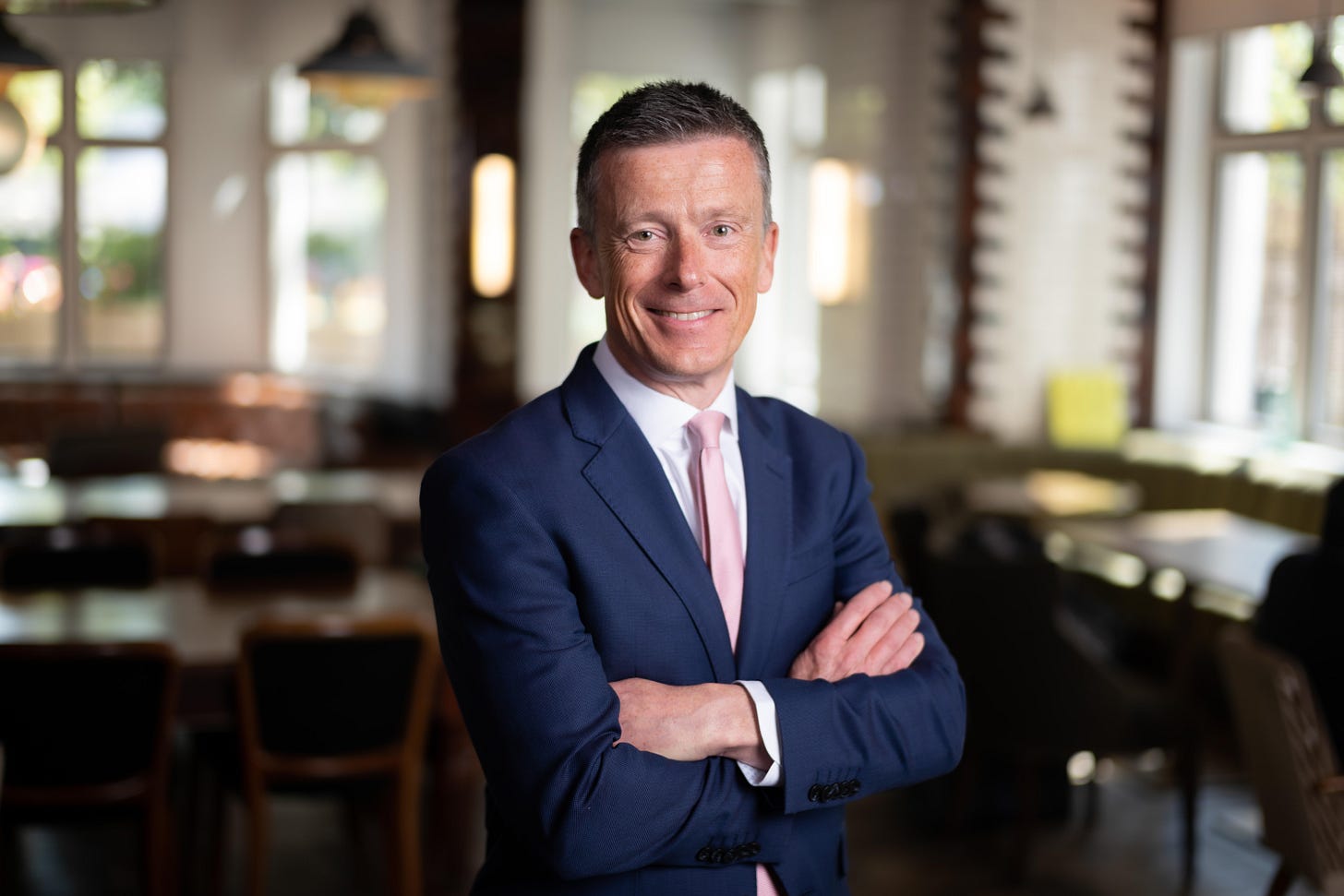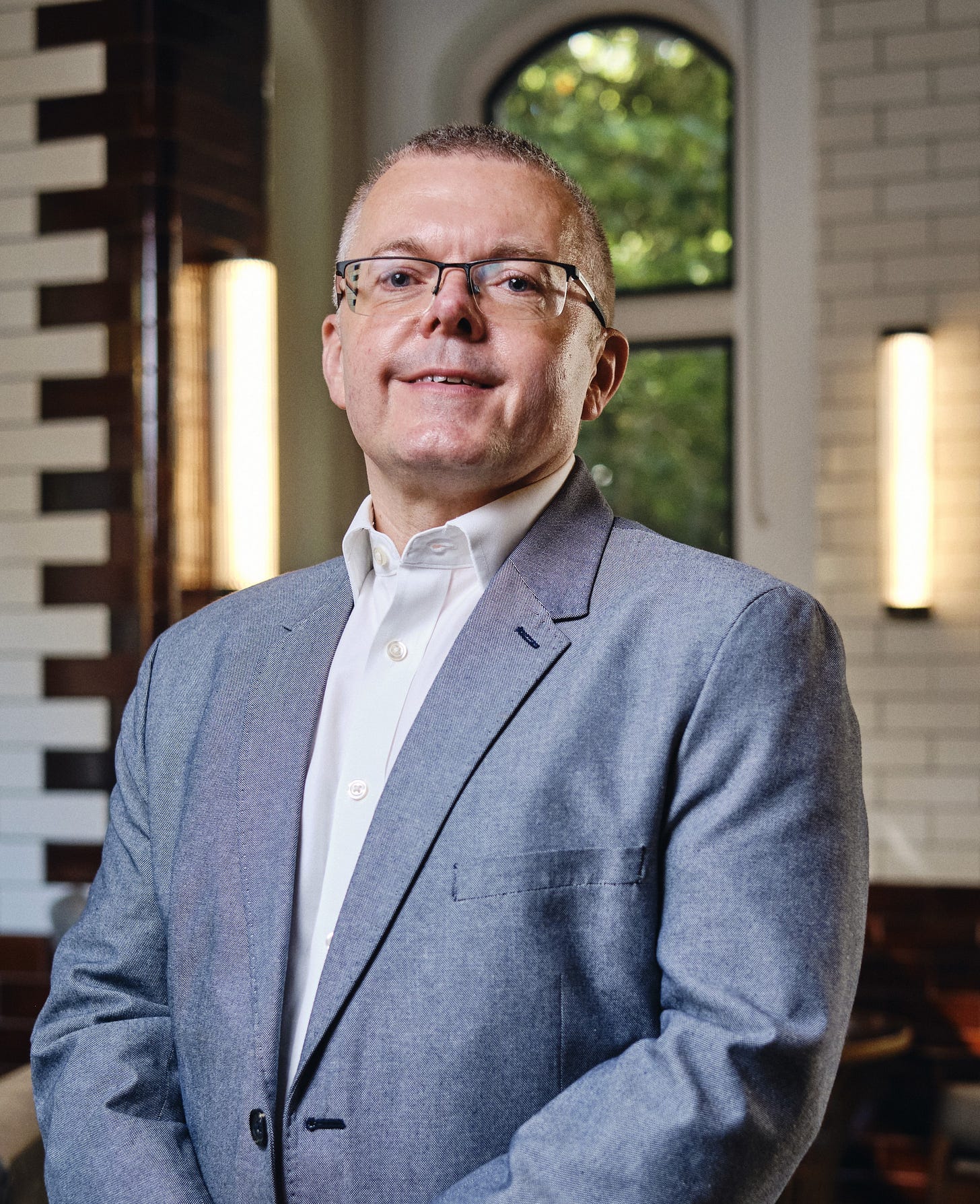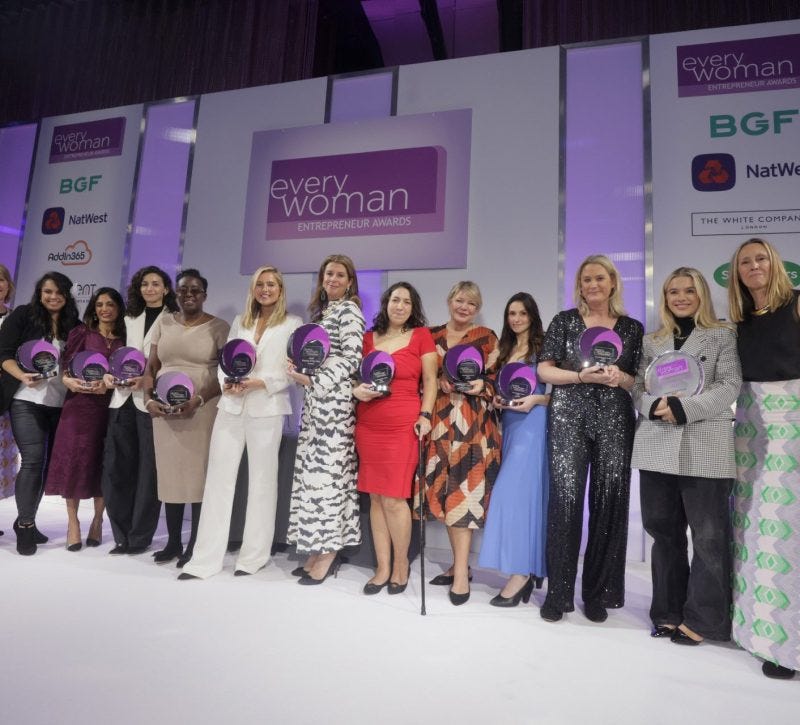Why running BGF is about winning hearts and minds
Andy Gregory, CEO of BGF tells Rainmakers about the importance of purpose and difference
Hello Rainmakers,
Here’s a great piece from last year which really stands the test of time.
We’ll have a fresh Rainmakers piece for you tomorrow, and a round up on Friday, but for now, we’re also sharing some of our most popular pieces from the archive.
Andy Gregory, the chief executive of BGF, spoke to us after an exhilarating awayday with his team.
The former classical musician is as thoughtful as he is ambitious. He’s also very usefully mapped out for our Rainmakers readers just what makes BGF different in a very crowded and ever changing investment landscape.
It’s for our Rainmakers subscribers, it’s the kind of fresh, detailed and genuinely insightful content we are committed to bringing you. Don’t miss out. Subscribe today.
WHAT MAKES BGF DIFFERENT
When Andy Gregory took to the stage at the all-staff get together of BGF earlier this year he had one thing on his mind.
Talent.
Not just the 200 members of his team who were staring up at him as he started his speech, but all the executives, entrepreneurs and their teams who BGF is investing in.
CEO since 2022, the thoughtful Scot had 11 years in the business as its director of the North, based in Manchester, before taking the top job at BGF which takes minority equity stakes in businesses with growth potential.
But for a leader who came south to study at the Royal Northern College of Music in Manchester, has been focusing fiercely on getting the right tune out of the BGF team, spread out across 15 different offices.
Unlike a standard private equity fund with investors and limited partnerships to satisfy, BGF is different because of its heritage, originally formed as the Business Growth Fund. It was born out of the financial crisis of 2007 and 2008, as a way of proving that the High Street mainstream lenders could do something positive to support Britain’s growing business.
Its shareholders are NatWest, Barclays, HSBC and Lloyds, with a small holding retained by Standard Chartered.
Part of his challenge, he says, is more subtly influencing the performance of businesses from a minority position.
“We can't just say we're in control. Do this. It needs to be winning hearts and minds, and I think having an influence. So for that reason, and a raft of others, the quality of people we need is really high.”
I ask him what it is that makes someone with a corporate finance career opt to join BGF? It can’t just be the money, he says.
WHY BGF IS DIFFERENT
BGF has cash on the balance sheet, so is slightly insulated from the harsh fundraising market of private equity, and has what he describes as a “differentiated offer”.
“We've got a fantastic platform, we’re well resourced, there are high barriers to entry, we have a good portfolio and increasing momentum.
“But you are just exposed to many, many more businesses than most people are,” he says of his team. “They've got broad and diverse ways in which they can interact and support businesses, which is massively important because of what we need in our model, but it also means they will progress faster and get more experience, more quickly. They'll sit on boards much earlier, probably than they would elsewhere. So again, the quality of experience will be greater and faster.”
He hesitates when he says it, possibly hinting that he thinks I won’t believe him, but he also stresses the centrality of “purpose” and that what they are doing for businesses has to mean something positive.
“Our purpose is so important,” he says, “but then that continues to evolve, probably year after year after year. So we were set up with a purpose, our purpose to do the right thing is so important our shareholders.”
INVESTING IN TALENT
The other side of the talent coin is the boards of the portfolio companies. BGF has recently hired Johnathan Massey, an incredible well networked executive with private equity and recruitment sector experience with Rowan, part of LCap Group.
He will be based at BGF’s Manchester office, but will also work alongside teams in the Midlands and Scotland. As Talent Network Manager, he will be responsible for developing and nurturing relationships with an external network of experienced board directors, in order to introduce management teams in the BGF portfolio to a pool of exceptional talent.
He’ll be joining what is called the value creation team at BGF helping investee companies to “build out robust and strong management teams.”
IN DEFENCE OF THE BANKS
As well as presenting to his staff and to portfolio companies Gregory also keeps in constant touch at a CEO level with the major banks, with whom he says he enjoys strong relationships.
He says: “I don't think the banks get nearly enough credit for what they've done in supporting us, and they were obviously strongly encouraged to support us in the early days, but they have kept that support there.
“We're 13 years in with £2.6 billion on our balance sheet.
He points out that since 2011, BGF has helped grow the likes of Bramble Energy, Amdaris, St Pierre Groupe and Kids Planet, but also that it’s launched BGF in the Republic of Ireland and the minority investment model has since gained global momentum, with Australian and Canadian BGFs being set up in 2018 and 2020, respectively.
“In just in the last couple of months, I’ve caught up with the bank CEOs to update them on what we're doing, and we do have very strong engagement. We are now self sufficient. We're paying dividends. So economics are working, which is great, but I think as importantly very much, is we're actually still doing what we're supposed to be doing and fulfilling purpose.”
But while he says the fundamentals of BGF have stayed pretty much the same, the financial ecosystem around the business has changed enormously.
“Over the last 13 years, there's a much more crowded, competitive landscape with funding available across the board. And I think there's lots of different sources from that. Obviously, over that period, particularly, you know, you've got debt funds coming to the fore, family offices formed by high net worth entrepreneurs with lots of capital to invest, so we can't stand still. We need to continue to evolve.”
The main difference he says, after much thought, is that BGF’s relationship with the companies it supports.
“We’re not buying businesses, we’re investing in them,” he says.
“How we go about that is more nuanced. So a lot of what we do is about making sure that we are in a good position to interact with businesses in positive or negative situations.
“We are investing into a business and supporting entrepreneurs. So the assessment of the entrepreneurs and their teams, their willingness and openness to be influenced is really, really important,” he stresses.
“When things don't go well, forget whatever is in the legal documents. You know, if we haven't got a strong relationship and that ability to influence is not there, then things are very hard. So we do put a lot of effort and focus into those relationships, and we challenge ourselves a lot on the way in to an investment,” he says.
THE ROAD TO B CORP
I put it to him that only a small number of businesses in the investment space have made the journey to becoming a fully accredited B Corp, which he says surprisingly wasn’t a stretch for them to achieve.
“I don't say this at all arrogantly or or complacently, but securing B Corp was not something that we've put lots and lots of effort into. It was hopefully much of an endorsement of many things we were already doing.”
But he adds, there has been a huge push into diversity and inclusion across the business.
“We have put a huge amount of effort into diversity in our chairs and in supporting female entrepreneurship. We hold events in our offices showcasing some fantastic role models in the portfolio in order to promote female entrepreneurship.
“Roughly speaking, getting on for a quarter of our non executive directors that we appoint are female. So again, we can heavily influence that.”
But he ends our conversation with some missionary zeal.
“It's not just capital,” he says. “I think there's a lot more to be done to support entrepreneurship. A lot of what we're doing in early stage investments, with life sciences and cleantech in supporting markets that are not functioning as they should be. That's hugely important.
“And we've got too many businesses that are selling out early and getting taken out by US trade, private equity. I think we’re helping to build long term value and growing value with equity which is sustainable and so important in the current climate.”
::
::
Thank you for subscribing to Rainmakers.
We believe in good journalism that is worthy of your support. Please share this edition of Rainmakers so we can grow the message further and wider.
The insights and commentary we share with you are rooted in the trust we have built in the business community.
We’re also on LinkedIn - please join our Rainmakers community group for updates and offers and opportunities to comment.
If you have something you think we should look at, then either reply to this newsletter or email michael.taylor@thebusinessdesk.com.







